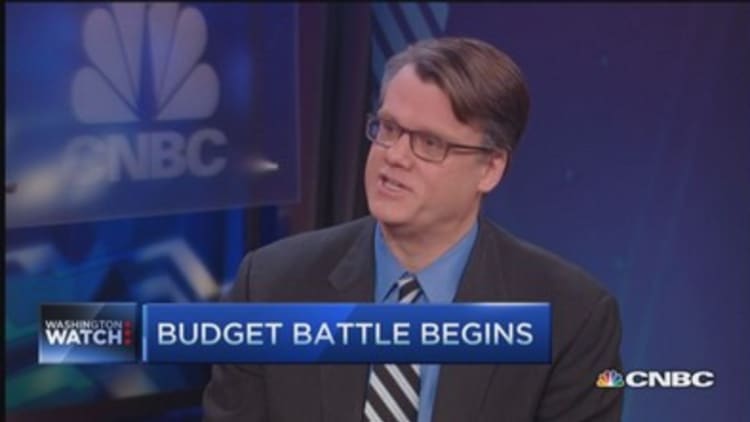
Presidential budgets, especially with the opposition party firmly in control of Congress, are often forgotten within days. This year's proposal from President Barack Obama may be different for two reasons.
First, the budget makes a serious initial offer on corporate tax reform. And second, it plants a political flag well to the left on spending and taxation that Hillary Clinton may find somewhat challenging assuming she takes over as the Democratic Party standard bearer during the 2016 presidential campaign.
On corporate taxes, Obama is proposing a one-time 14 percent levy on the $2 trillion in profits currently held overseas by U.S. corporations, much of it by tech and pharmaceutical giants. He would use the $238 billion from this one-time tax to fund infrastructure spending on crumbling roads and bridges. Republicans reacted negatively to the proposal but did not completely reject the idea.
Read More
That's in part because former House Ways & Means Chair Dave Camp last year proposed a one-time 8.75 percent repatriation tax and would also have spent some of the proceeds on infrastructure. That proposal went nowhere but there is clearly some room for a deal a repatriation tax rate coupled with a new system for taxing overseas profits in the future.
Obama wants to put a 19 percent tax on future offshore earnings. That's a higher level than corporate America and most Republicans want. But it would be lowered by credits for foreign taxes and could also serve as the basis for negotiations on a deal that gets rid of the current noncompetitive U.S. system that keeps this money trapped abroad to avoid a 35 percent hit while encouraging "inversion" transactions that move companies out of the U.S.
Read MoreObama targets foreign profits with tax proposal, Republicans skeptical
The problem is that prospects for robust negotiations on corporate tax reform are not very good. Obama and congressional Republicans remain far apart on domestic spending and whether tax reform should raise new revenue. And the parties will need to make a deal in the fall to raise the debt limit and fund the government past Oct. 1. Well before that, Congress and the president will have to agree on how to fund the Department of Homeland Security beyond next month. The GOP wants to tie funding to rolling back Obama's unilateral moves on immigration. The president would veto any such efforts.
Expecting Washington policymakers to get beyond upcoming fiscal cliffs and hash out a complex corporate tax reform deal just as the 2016 presidential campaign takes shape is probably not wise. House Ways and Means chair Paul Ryan would certainly like to make such a deal. But don't bet on it happening.
On the political front, the budget stakes the Democrats on solidly progressive ground by blowing through sequester spending caps, raising capital gains and other taxes on the wealthy and adding $6 trillion in new debt over 10 years. Obama wants two years of free community college, expanded refundable tax credits and other initiatives designed to begin to address the growing wealth gap.
It's a budget that progressives will love as it rejects most of Obama's previous infatuation with spending restraint and long-term deficit reduction (while not exploding the deficit in the near term).
The question is whether it will make things uncomfortable for Clinton later this year. The former first lady, New York senator and secretary of state is more of a natural centrist whose husband famously cut capital gains rates and helped spark an economic boom. And most polling data suggest the country still cares about the impact of the $18 trillion national debt.
Clinton could wind up staking out a middle ground between Obama and the GOP on taxes and spending and offer a slightly different program for boosting growth while addressing income inequality. But the president's pivot back to the left could also open her up to Republican arguments that a vote for Clinton would be a vote for tax and spending policies that could lead to fiscal crisis down the road.
Read MoreDeflategate: Just what the country needed now
Still, in order to effectively make that argument, whoever emerges as the Republican nominee will have to come up with a set of fresh policies that contain long-term debt and help boost stagnant middle-class incomes. Obama and the Democrats are laying their approach on the table in this budget plan. It's now up to Republicans to counter.
—Ben White is Politico's chief economic correspondent and a CNBC contributor. He also authors the daily tip sheet Politico Morning Money [politico.com/morningmoney]. Follow him on Twitter @morningmoneyben.


